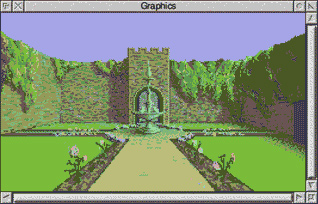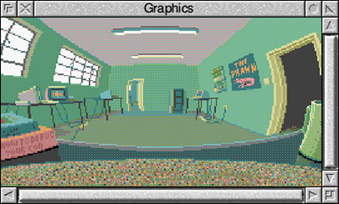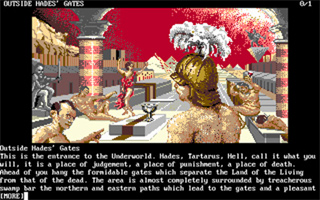News
News Archive
Downloads
Articles
Links
--------------------------
The Games
- The Pawn
- The Guild Of Thieves
- Jinxter
- Corruption
- Fish!
- Myth
- Wonderland
- The Magnetic Scrolls
Collection Vol. One
- The Legacy - Realm
Of Terror
--------------------------
Magnetic Interpreter
--------------------------
The Message Board
Guestbook
--------------------------
About The Website
Contact
|
| A
brief history of Magnetic Scrolls and Acorn - Page
Two |
Article written by Andrew Weston
based on the article that appeared in Issue 284 of Qercus Magazine (© Acorn Publisher) - used with kind permission
|
Releases
|
Of
the seven different games released, only six made their way
to Acorn computers excluding Myth which in fact was released
to a select adventure club membership. Most were distributed
by Rainbird but later titles by Virgin Mastertronic (which confusingly
also owned the UK publishing division of erstwhile adventure
games publisher Melbourne House during this period). Slightly
different packaging accompanied the UK and US versions but for
each game a preamble to the game on the box provided an amusing
or, at least, intriguing insight into the game you were considering
buying. In order of original release the games were as follows.
The
Pawn: a quest to escape from the fantasy world of Kerovnia
which you have been transported to featuring characters and
objects with complex properties. This adventure was highly commended
in reviews for its atmosphere and descriptions which were greatly
enhanced by the detailed artwork in those versions with graphics.
Bursting onto the text adventure scene with a 3500 word parser
was not to go unnoticed either.
Guild
of Thieves: again set in Kerovnia where the player becomes
a member of the Guild and is tasked with a mission of theft.
Both The Pawn and Guild of Thieves won quite prestigious awards.
|
 The Pawn: 16 and 32-bit version graphics
The Pawn: 16 and 32-bit version graphics
|
|
Jinxter:
a humorous, magic-laden adventure with the unique feature of the
player being rescued and lifted out of a situation where in other
games they would "die". At this point, producing quality
games that would appeal to the expectation for more sophistication
and depth of the game-buying and reviewing public was becoming
ever more difficult and for the 16-bit machines even moreso. Consequently
the number of programmers at Magnetic Scrolls and other contributors
brought in for each game began to swell. This was also the last
Magnetic Scrolls release for the Apple II and Atari 8-bit computers. |
 The Magnetic Scrolls office through a fish-bowl?
The Magnetic Scrolls office through a fish-bowl?
|
Corruption:
a game set in the City of London where word-of-mouth information
is key to developing story. The Amiga version won Game of the
Year at the Personal Computer awards but it seemed that the
amount of atmosphere being crammed into the games at this point
was proving too much for the 8-bit machines with the Amstrad
version reportedly having to make very frequent access to the
disc. Interestingly, the game was provided with audio tapes
which the game prompted the player to listen to in order to
extract information at certain stages.
Fish!:
a bizarre title involving an anthropomorphic fish and a marine
society. At this stage, Magnetic Scrolls parted from Telecomsoft
(with a deficit of more titles under their contract, judging
from what can be gleaned from interviews). The last release
by the company for the Macintosh and Spectrum.
|
Myth:
described as a "mini-adventure", this was set
in Ancient Greece with mythological and religious overtones.
Myth was only available to members an adventure club, Official
Secrets, set up by Tony Rainbird after he left Telecomsoft
(having been taken aboard by the company to market their
"Firefly" software label which - no doubt by no
coincidence - was transformed into three brands - Firebird,
Silverbird and Rainbird). This title was commissioned by
Tony Rainbird and is the only Magnetic Scrolls game that
wasn't released for the Archimedes. It was also set to be
the last outing on 8-bit machines by the company.
Wonderland
(incorporating Magnetic Windows): this was the company's
biggest and most lavish product and this is reflected by
the relative size of the production team that worked upon
it. As the computers becoming available to home users on
a large scale started to implement in their operating systems
the mouse, icons and windows interface, the company devised
their own in-game mouse-driven environment. This reportedly
consumed most of the company's energy whereas previously
they had been able to divide work between more than one
game. Based on
|
 IBM-PC version of Myth
IBM-PC version of Myth
|
Previous page / Next
page
Back
to Articles page
|


